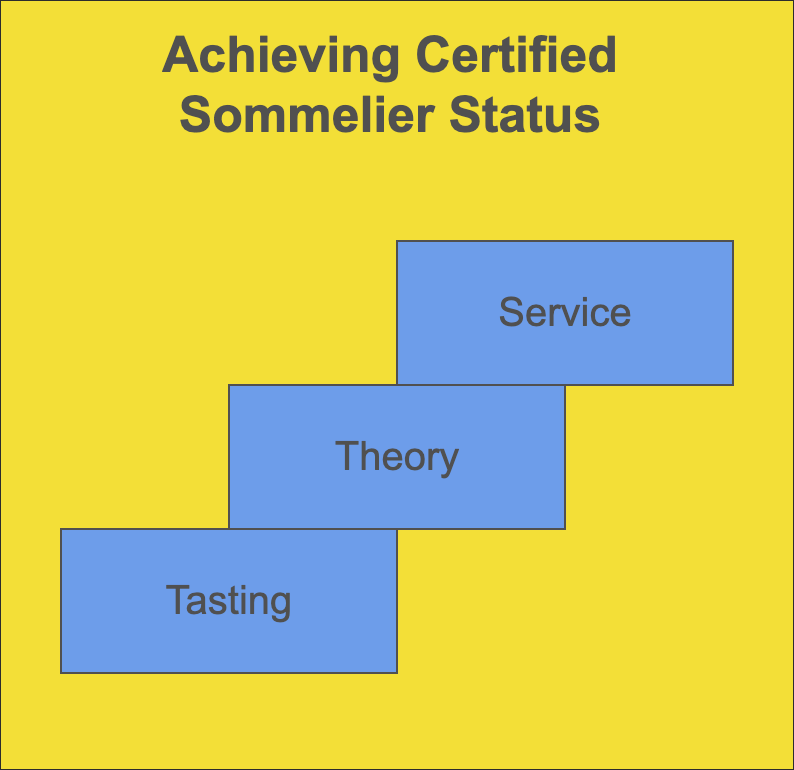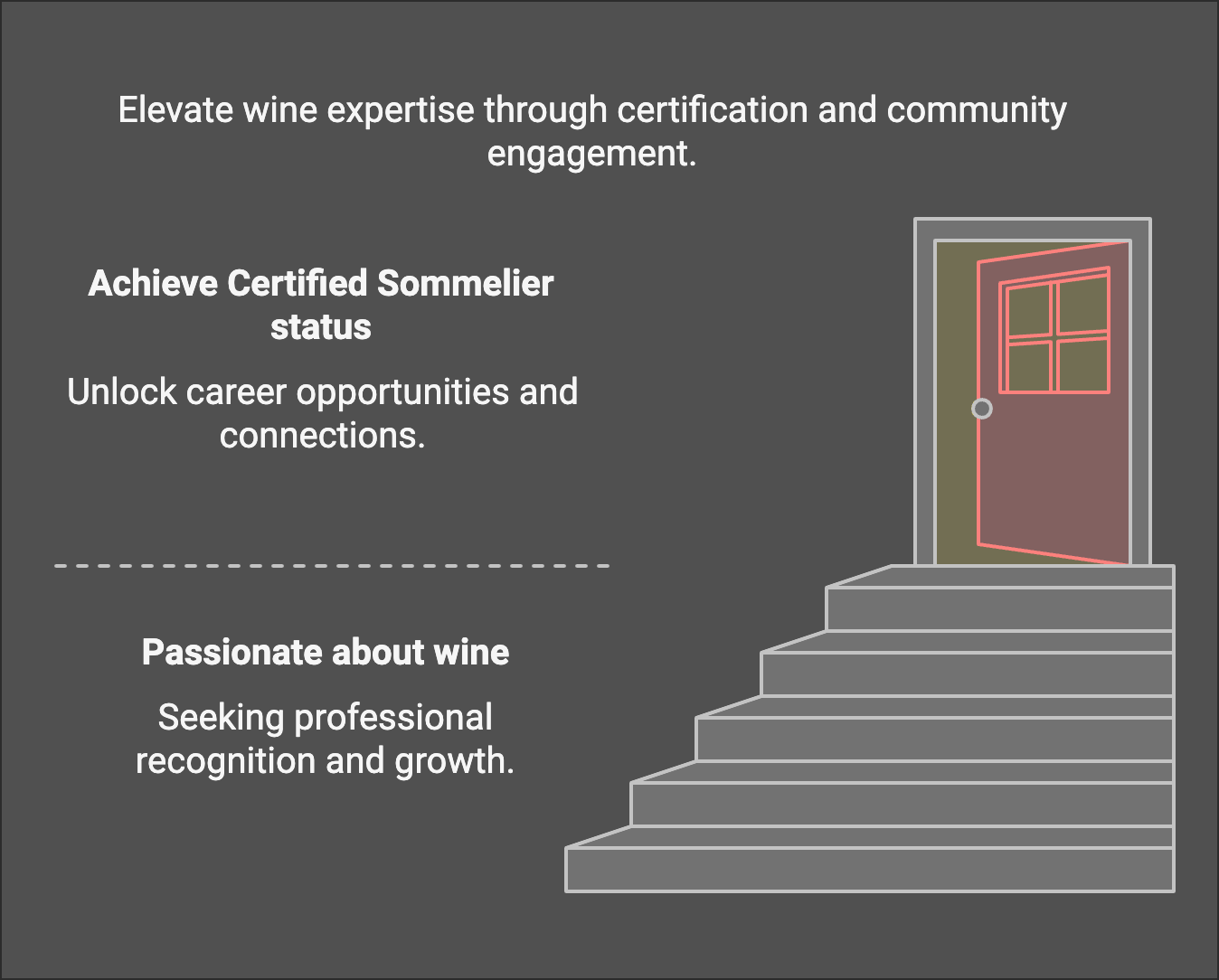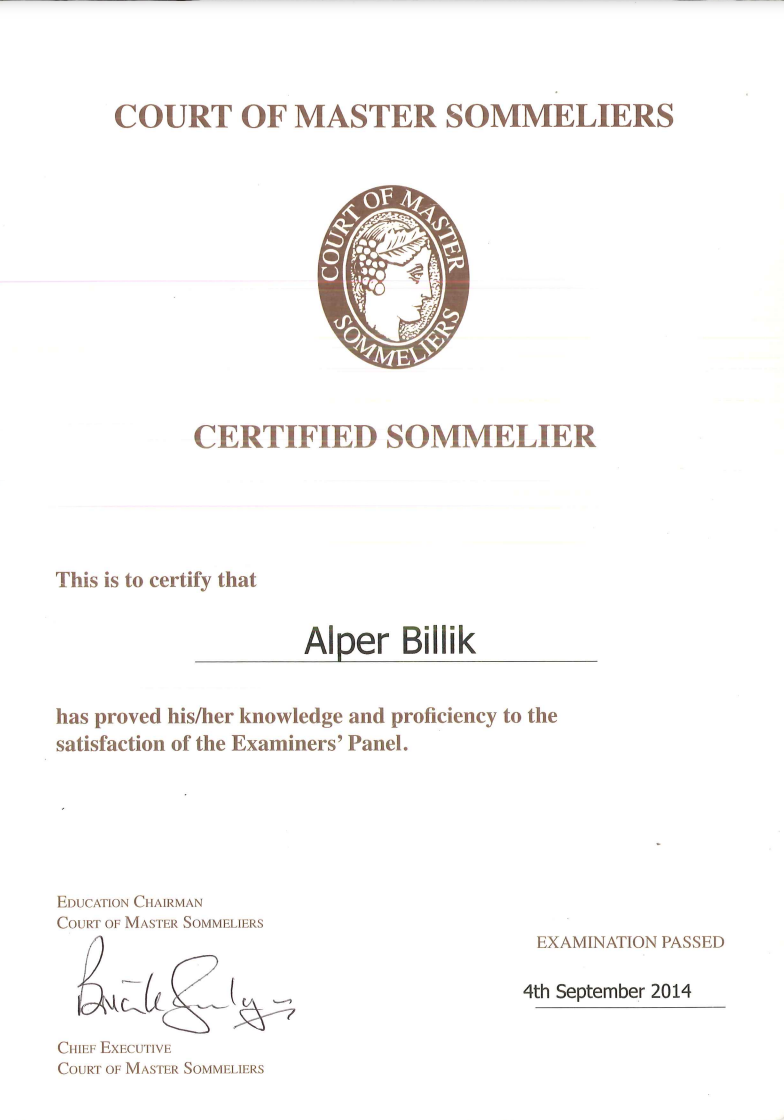The Certified Sommelier Exam: Essential Tips & Preparation
Back in 2014, I passed my Certified Sommelier Exam in Hong Kong. Since then, I've helped friends and colleagues do the same. It's been a great experience, and I've learned a lot.
Now, I want to share what I've learned with you. If you want to pass the Certified Sommelier Exam, this blog is for you. I'll give you straightforward tips and advice to make your study easier and more effective.
Let's dive into the world of wine together and get you ready for your exam. Here we go!
The Certified Sommelier Exam is a comprehensive test assessing your knowledge and skills in wine. It's divided into three main parts:
Tasting: This section tests your ability to identify and describe wines. You'll be blind-tasting different wines and need to analyze their characteristics like grape variety, region, and vintage.
Theory: Here, your knowledge of wine regions, grape varieties, wine-making processes, and wine theory is tested. It's a written exam that covers everything from the basics to more complex aspects of the wine world.
Service: This practical section evaluates your skills in wine service and hospitality. It includes tasks like proper sparkling wine service and your ability to interact with guests and handle their inquiries.
Importance of the Certified Sommelier Certification
For anyone passionate about wine, becoming a Certified Sommelier is a significant achievement. It's not just about having a title; it's recognizing your expertise and dedication to the field. This certification:
Boosts Credibility: It shows your commitment to understanding wine professionally.
Opens Opportunities: With this certification, career paths in restaurants, wine bars, and the broader wine industry become more accessible.
Builds Connections: Being a certified sommelier connects you to a community of wine professionals and enthusiasts, fostering opportunities for networking and learning.
In short, the Certified Sommelier Exam is more than just a test. It's a journey into the depths of wine knowledge, a challenge to your tasting and service skills, and a gateway to new opportunities in the wine community.
Preparation Strategies for the Certified Sommelier Exam
Study Techniques for Theory
Consistent study is key to excel in the theory part of the exam. Here are some tips:
Daily Study: Dedicate at least 15 minutes daily to studying wine theory. It's about building a habit rather than cramming.
Focus Areas: Concentrate on regions, grape varieties, wine-making processes, and wine laws.
Use Varied Resources: Mix up your study materials – books, online articles, and even wine apps can be incredibly helpful.
Take Notes and Review: Writing things down can significantly improve memory retention.
Developing Tasting Skills for Certified Sommelier
Tasting skills are crucial, and here's how you can sharpen them:
Daily Tasting: If you're working as a sommelier, take the opportunity to taste wines daily. Use your work environment to your advantage.
Practice Blind Tasting: Regular blind tastings can greatly enhance your ability to identify wines. Try to guess the grape, region, and vintage.
Expand Your Palate: Don't just stick to familiar wines. Challenge yourself with new and varied types.
Enhancing Service Skills
Service is an art in itself, and here's how to polish it:
Focus on Sparkling Wine Service: Practice opening and serving sparkling wine. Aim to pour it evenly into eight glasses – a skill that'll come in handy.
Real-World Practice: Use your time at work to refine your service skills. Pay attention to details and guest interaction.
Study Classic Cocktails: Don't overlook other beverages. Knowing classic cocktails is also part of being a well-rounded sommelier.
By integrating these strategies into your daily routine, you’ll be well-prepared for each aspect of the Certified Sommelier Exam. Remember, consistency and variety in your preparation are key!
“Becoming a Certified Sommelier opens doors to a world of wine, food, and hospitality, elevating your career and expertise.”
Recommended Resources for Certified Sommelier Exam Preparation
Preparing for the Certified Sommelier Exam requires more than just dedication – it requires the right resources. I found several helpful tools throughout my journey, and I'd like to share them with you.
Books and Online Platforms
GuildSomm: This is an exceptional online resource I personally used. It offers in-depth articles, study guides, and a community forum that are invaluable for both learning and networking.
Wine Puzzle Book: I've also designed a unique tool – a wine-themed crossword puzzle book. It's specially tailored for the Certified Sommelier Exam, covering all the key topics. This book isn't just educational; it's a fun way to reinforce your wine knowledge.
Workshops and Courses
Interactive Workshops: Attending workshops can provide hands-on experience and direct feedback from experts in the field.
Online Courses: Numerous online courses cover various aspects of wine knowledge. These can be a great supplement to your study routine.
Personal Experience and Tips for the Certified Sommelier Exam
Passing the Certified Sommelier Exam was a milestone in my wine journey, and I was fortunate to clear it on my first attempt. However, this journey wasn't without its challenges, and I'd like to share some insights that might help you in your own journey.
My Challenges and How I Overcame Them
The Theory Part: The most challenging aspect for me was the theory part of the exam. It's extensive and requires a deep understanding of various wine-related topics.
Preparation Approach: I tackled this by setting a consistent study routine, focusing on daily topics. Making notes and revisiting them regularly was crucial.
Utilizing Study Groups: Joining study groups or forums, like those on GuildSomm, was immensely helpful for discussing topics and getting different perspectives.
Valuable Advice for Aspiring Sommeliers
Take Advantage of Master Classes: Before the exam, you can study with a Master. These sessions are invaluable. Pay close attention, and don't hesitate to ask questions.
Understand Exam Expectations: These sessions also show you what to expect in the exam. Use this to your advantage to focus your studies in the right direction.
Practice, Practice, Practice: Whether it's tasting, theory, or service, consistent practice is key. Try to simulate exam conditions as much as possible during your practice sessions.
Key Takeaway
Stay Confident and Composed: Remember, it's normal to feel overwhelmed sometimes, but staying confident and composed will help you greatly. Trust in your preparation and believe in yourself.
Passing the Certified Sommelier Exam is as much about knowledge as the approach and mindset. I hope my experience and these tips help you feel more prepared and confident as you approach your exam day.
The Exam Day: What to Expect and How to Handle It
The day of the Certified Sommelier Exam can be a whirlwind of emotions and activities. Based on my experience, here’s a breakdown of what to expect and some tips on managing your day effectively.
Exam Day Structure
Morning Session - Blind Tasting and Theory Exam: The day starts with blind tasting, followed by the theory exam. These are usually scheduled back-to-back.
Break: After the morning session, there's a break. Use this time to relax and mentally prepare for the practical exam.
Afternoon Session - Practical Exam: This includes sparkling wine service, cocktail preparation, wine pairing, and sometimes questions about producers for wine and food pairing.
Results Announcement: At the end of the day, a Master Sommelier will announce who has passed the exam.
Tips for Managing Time and Stress
Prepare the Night Before: Ensure everything is ready – from documents to your outfit. This reduces morning stress.
Dress Appropriately: Wear a suit; a tie is optional but recommended. Looking professional is part of the exam.
Stay Calm: Practice deep breathing or mindfulness to keep calm. Remember, it’s okay to be nervous.
Time Management: Keep an eye on the time, but don’t rush. Quality over speed is important, especially in practical tasks.
Staying Positive and Confident
Believe in Yourself: Confidence comes from knowing you’ve prepared well. Trust your knowledge and skills.
Visualize Success: Imagine yourself performing each task successfully. This can be a powerful tool for maintaining a positive mindset.
Stay Focused: Keep your mind on the task at hand. Avoid getting distracted by other candidates or your own nervousness.
Remember, the exam is not just a test of knowledge but also poise and professionalism. Stay calm, be confident, and give it your best shot.
Post-Exam: Next Steps and Career Advancement
Passing the Certified Sommelier Exam is a fantastic achievement, but it's just one milestone in your ongoing wine journey. Here's what to consider next for continued growth and opportunities.
Embrace Continuous Learning
Keep Studying: The world of wine is vast and ever-changing. Stay curious and continue learning about new wines, regions, and trends.
Pursue Further Courses: Consider advancing to the next level of sommelier courses. Each level brings deeper knowledge and more recognition.
Leverage Your Certification
Career Opportunities: Your certification opens doors in the wine industry. You can aim for higher positions in restaurants hotels, or even explore roles in wine distribution or sales.
Networking: Use your certification to connect with other professionals. Attend industry events, wine tastings, and seminars.
Setting Realistic Expectations
Be Patient: Landing your dream job might take time. Use your certification as a stepping stone, not the final destination.
Continuous Growth: Your journey as a sommelier is about continual growth and adaptation. Keep challenging yourself and expanding your skillset.
Making the Most of Your Certification
Showcase Your Skills: Use your newfound knowledge and skills to enhance your current role. It could be creating a better wine list or offering more informed recommendations to customers.
Mentor Others: Share your knowledge and experiences with those coming up in the field. Mentoring can be a fulfilling way to give back to the community.
The Certified Sommelier Exam is more than just a test; it begins a lifelong journey in wine. Embrace the opportunities and challenges that come your way, and remember the learning never stops.
l want to share some example questions from my side to understand wine better.
Remontage:
What is the purpose of Remontage in winemaking?
How does Remontage affect the character of a wine?
What is the difference between Remontage and Delestage in winemaking?
Monterey:
What are the signature grape varieties grown in Monterey, California?
What is the climate and soil like in the Monterey wine region?
How do the wines of Monterey differ from those produced in other regions of California?
Cape Classique:
What is Cape Classique wine?
What are the primary grape varieties used to produce Cape Classique wines?
What is the history of Cape Classique wine in South Africa?
Sherry VOS & VORS:
What do the terms VOS and VORS mean when referring to Sherry wine?
What criteria are for a Sherry wine labeled as VOS or VORS?
How does the aging process for VOS and VORS Sherry wines differ from other Sherry styles?
Sub-districts of Chianti:
What are the sub-districts of Chianti, and what are their unique characteristics?
How do the wines produced in the different sub-districts of Chianti differ?
What is the significance of the Chianti Classico sub-district in Chianti wine production?
5 Tips for Blind Tasting Classic Wines During the Certified Sommelier Exam
Taste as many classic wines as possible before the exam: To become familiar with the flavor profiles and characteristics of classic wines, try to taste as many of these wines as you can before taking the exam.
Familiarize yourself with the tasting grid: You will be given a tasting grid to record information about the wine during the blind-tasting portion of the exam. Understanding how to use this grid and what information you need to record is important.
Pay attention to the wine's aroma: The smell of the wine can provide important clues about its origin, variety, and age. Be sure to take the time to smell the wine and note any distinctive scents you detect.
Focus on the taste: During the tasting portion of the exam, pay close attention to the taste of the wine. Note any bitterness, sweetness, acidity, and tannins and how they balance.
Take your time: Don't rush through the tasting portion of the exam. Take the time to analyze each wine and record your observations. A slow and deliberate approach will help you to identify the wine more accurately.
Familiarize yourself with classic cocktails: You will be asked about them during the service exam, so it's important to know the ingredients and preparation methods for popular cocktails such as a Martini or Manhattan.
Know your wine producers: You will also be tested on your knowledge of wine producers. Ensure you know the history and key characteristics of prominent wine producers worldwide.
Practice wine pairings: The service exam will include questions about food and wine pairings. Take the time to practice pairing different types of wine with various foods to improve your skills in this area.
Study fortified wines: During the service exam, you will be asked about fortified wines like Sherry or Port. Ensure you understand these wines' production methods, flavor profiles, and serving suggestions.
Practice serving sparkling and still wines: You will serve either sparkling or still wines during the service exam. Practice serving wine to improve your confidence and accuracy, and use proper pouring techniques.
2014
I passed my certified sommelier exam on my first attempt in Hong Kong.
Conclusion
As we reach the end of this guide, let's revisit the key takeaways for your journey toward becoming a Certified Sommelier:
Consistent Preparation: Regular study, tasting, and service practice are the pillars of success.
Resource Utilization: Use various resources, like GuildSomm, workshops, and the unique tools we offer at SOMM DIGI.
Mindset and Approach: Stay confident, embrace continuous learning, and view the exam as a step in your ongoing wine journey.
I encourage you to engage with more content on my blog and explore SOMM DIGI for additional resources.
Our Wine Puzzle Book, tailored to help with exam preparation, is a fun and effective tool to keep your wine knowledge sharp. You can get it free with our membership program or purchase it in PDF or paperback format.
Remember, passing the Certified Sommelier Exam is not just about earning a title; it's about embarking on a lifelong adventure in wine. Stay curious, keep learning, and enjoy every step of this exciting journey.
Here's to your success, and I can't wait to hear about your achievements!
Cheers to your wine adventure!
Alper, Advanced Sommelier




